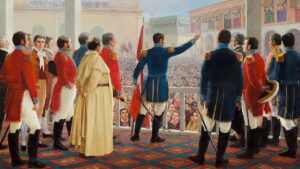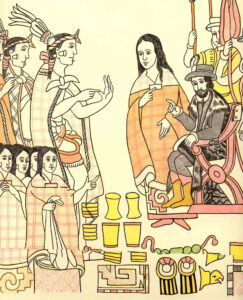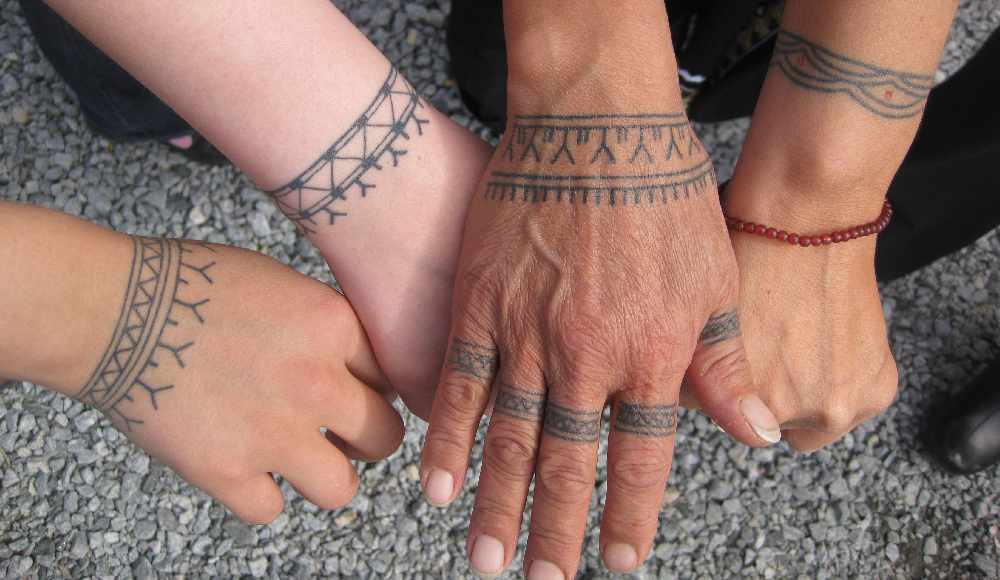Should a German woman be allowed to have a phrase in an indigenous language tattooed on her arm?
That’s the question that I was confronted with by someone I met, a couple of months ago, at a small gathering. This is the story of Hannah (not her real name, of course), a young woman whose heart bled for the Spanish Culture and who did voluntary work for an entire year at a retirement home in Peru. I have no idea how many diapers she had to change and how many untold stories she heard by many of the residents of this house, even in some obscure languages that maybe she had never ever listened to, until that point in her life.

From the language of the «oppressors» to the language of the «oppressed»
One of these was no other than Quechua, the imperial language of the Incas, that thanks to their military and diplomatic conquests, was spread from the heartlands of Peru across South America during the XVth Century.
Regardless of its glorious past, this language and the various nations under its imperial umbrella have been oppressed or almost forgotten at the later stages of the Spanish Empire and specially during the republican era. In the case of Peru, it was only acknowledged as an official language in the early 1970s by the left wing military dictator Juan Velasco Alvarado (1). That is more than a hundred fifty years AFTER José de San Martín proclaimed independence on a balcony at Lima’s main square.

This reality is well known to me (the writer of this article) in flesh and bone, since I am a peruvian myself and I can also attest a horrible discrimination in my own country of origin against quechua speakers. In these last ten to fifteen years the public discourse has luckily changed in favor of the pre-hispanic languages, but the racism and language discrimination is still latent in my country.
Hannah knew about this reality and although she was fascinated by the beautiful tongue of my ancestors, she asked me if it was okay for me if she, as a white European, tattooed a phrase in Quechua on her forearm.
The Black and Whites of Cultural Appropriation
When I asked her why she was so concerned about my opinion, she told me that she didn’t want to incur in “cultural appropriation” by doing this.
But, what is exactly “cultural appropriation”?
According to the Encyclopedia Britannica: “Cultural appropriation takes place when members of a majority group adopt cultural elements of a minority group in an exploitative, disrespectful, or stereotypical way” (2).
I will play the devil’s advocate and acknowledge that in certain cases this designation fits perfectly. A good example for CA (cultural appropriation) is the case of the French New-Age music project “Deep Forest” that blatantly stole a lullaby sung by a woman in the Solomon Islands (3) to then make thousands of euros without even throwing a penny back at its creator or at its community.
Of course, cases like this exist. I am very aware of them.
The Shades of Gray
Nevertheless I must emphatically address that in the current western discourse a pernicious cultural paranoia has sprouted out of this, where white people with dreadlocks are canceled on Friday for Future witch hunts (4).
Although the first guess would be that, of course, certain idiots stick themselves fanatically to a self imposed dogma, thus perverting the original idea, I, on the other hand, see inherent flaws to the core of CA if we were to understand it by the definition presented by the Encyclopedia Britannica.
For once, I must remind the reader of my indigenous origins, my hide is as brown as cinnamon sugar, my eyes and hair are as dark as tar; and quechua is the tongue of my mother (although unfortunately not my mother tongue). I would be easily classified as BiPoc (Black, Indigenous, and People of Color), a tag that I never chose, but that certainly applies to me. This has driven me to certain paradoxes in my life, like the one I mentioned at the beginning of this article and has made me think and rethink certain hypothetical scenarios regarding CA. For example, why can I wear lederhosen in october and why shouldn’t a German person be allowed to wear a poncho with andean motives?
The typical answer would be that, since I and my culture were systematically oppressed, any western European should think twice about wearing something typical of my nation. I, on the other hand, have the benefit of the lederhosen, because I can not incur in any offense to the German culture due to my nature as a systematically oppressed individual.
Somehow I get automatically classified as a victim of oppression and the German as a victimizer. Could the roles be possibly reversed under different circumstances? How about, if I, as a peruvian, were to wear a chinese tang suit?
Now the situation gets tricky. “How come?” – you may ask yourself, my dear reader.

Is anyone aware of the thousands of chinese people we tricked into brutal slavery, so that they could harvest the shit of marine birds on the coasts of Peru? (5) Or how about the other thousand polynesians that we hunted as if they were animals, so that they could continue the job? (6)
Don’t misunderstand me. In no way am I denying the existence of the obvious systematic oppression exerted by people of European origin across history. On the contrary I have experienced it myself. Nevertheless it is my duty to shine a light on the shades of gray that certain people, due to their naivety or dogmatic conviction, choose to ignore.
More often than not, there is no us
This is the case of the term BiPoc, which broadly stands for Black, Indigenous, and People of Color. I find, as a person categorized under this description, that BiPoc is a crude simplification of people by the color of their skins or by their origins. What about our interests as different groups? Certain historical facts tend to be ignored for questioning pre-conceived manichaeistic narratives of us, because more often than not, there is no us. For example, during the Spanish conquest of Mexico (which is infamously, and in my opinion wrongly, used as an example of oppression by a european power) Hernán Cortéz was able to defeat the Aztec empire thanks to the crucial logistic and military aid by the Tlaxcaltecas, Totonacas and Texcocanos, among other groups (7).

You may ask yourself, why would a Tlaxcalteca or a Totonaca join the Spaniards? Why didn’t they all fight against the white European oppressors? My counter-question would be: Why, on earth, would they? The Tlaxcaltecas had been fighting the Aztecs for a long time and the Totonacas were sick to be under Aztec rule and to have to yearly send hundreds if not thousands of their fellow men to be sacrificed on top of pyramids. Just imagine being a Totonaca fighting side to side with the Aztecs against the Spaniards, while thinking “we are brown people and we should stick to our own kind”. Does this sound logical to you? Or maybe a tad racist? For me, it sounds like an AFD wet fantasy.
Another example that I would like to mention are the african slave traders (8). That idea of europeans entering the jungles of Western Africa to hunt for slaves is quite fraudulent, when you take into consideration that it was basically African kingdoms that captured people from different tribes to sell them into slavery.
How about Cherokee chiefs owning hundreds of slaves and ardously walking with them the trail of tears? How about native american nations siding with the southern states during the American Civil War, partly, so that they could keep their “human property”? (9)
We both ate from the same apple
Let’s stop firmly classifying each other in stone as oppressor and oppressed, when we both know that the roles are interchangeable through the passing of history. Let us all hold hands maliciously in fraternity as multi-cultural victimizers and accept with honest guilt the corpses that we often hide in our closets. Let us look ourselves in the eyes and acknowledge that regardless of the tonality of our hides, we are capable of the worst systems of oppression.
Systematic oppression is not inherent to people with a lighter skin tone, instead systematic oppression is a multicultural phenomenon, thus assuming that an individual BiPoc (which is a term as broad as “european”) can not offend the members of the “dominant” culture by wearing, say, a garment typical of them, whereas a white western European should be very careful when dressing as a, let’s say, indigena (which is likewise a broad term); results in some sort of paternalistic racism that I personally despise.
Said otherwise and in the most universal of descriptions: We both ate from the same apple and we both got kicked out of the garden of Eden. We both watched with delight and glee, when our kings and queens fought for decades for the gods they made. We both rode tanks, held general ranks, when the blitzkrieg raged and the bodies stank. We were around when Jesus Christ had his moment of doubt and pain and we certainly made damn sure the Pilate washed his hands and sealed his fate (10).
Conclusion
Therefore, having written all this and having established us all at the same level of intelligence and evil, I must declare that no, I do not feel offended by a foreign woman tattoing herself a phrase in Quechua on her forearm. Quite on the contrary, I feel very proud that the language of my imperialistic ancestors thrives in the skins of foreigners.
Instead what I do find offensive is the unintended arrogance of certain people that think that systematic oppression can not possibly come from the infantile fetishized version that they have of the BiPoc.

So, please, don’t underestimate the power of the previously systematically oppressed to create new systems of oppression, because that has been and will always be the eternal dance of history, where we all take the role of the ruthless cunt.
After all, we are all people from the same race… the human race. Or am I mistaken?
written by a fetishized BiPoc by the name of
Raúl «Radwulf» Valero-Chávez
25.08.2022
“…I must own, to the shame of my own countrymen, that I was first kidnapped and betrayed by some of my own complexion, who were the first cause of my exile and slavery…If there were no buyers there would be no sellers.”
– African abolitionist Ottobah Cugoano (1757-1791) (11)
Sources:
- https://larepublica.pe/sociedad/2021/08/28/el-quechua-la-lengua-oficial-discriminada-por-el-estado-y-la-sociedad-atmp/
- https://www.britannica.com/story/what-is-cultural-appropriation
- https://www.youtube.com/watch?v=_sCRcfYRslg&t=90s
- https://www.youtube.com/watch?v=UQcirFfV7vo
- https://library.brown.edu/create/modernlatinamerica/chapters/chapter-6-the-andes/moments-in-andean-history/chinese-peru/
- https://historiauniversalpnd.blogspot.com/2020/02/el-blackbirding-y-la-esclavitud.html
- https://arqueologiamexicana.mx/mexico-antiguo/el-papel-de-los-tlaxcaltecas-en-la-conquista
- https://aaregistry.org/story/tippu-tip-entrepreneur-and-slave-trader-born/
- https://www.smithsonianmag.com/smithsonian-institution/how-native-american-slaveholders-complicate-trail-tears-narrative-180968339/
- https://www.azlyrics.com/lyrics/gunsnroses/sympathyforthedevil.html
- https://docsouth.unc.edu/neh/cugoano/cugoano.html
